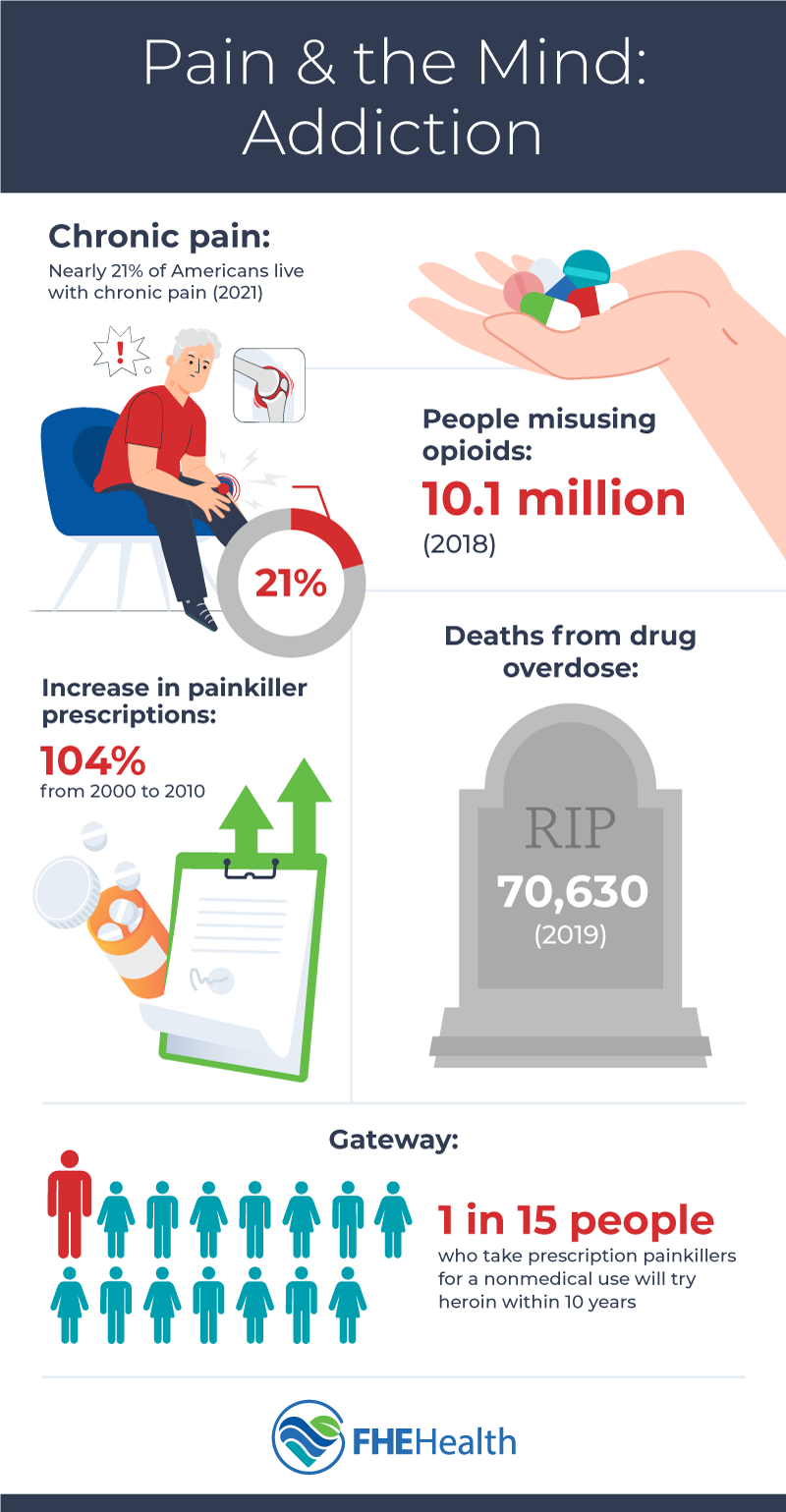
Chronic pain is any type of pain that lasts more than 3 months, including arthritis, back pain, cancer pain, headache and muscle pain. It can affect any part of the body, and it may occur all the time or come and go with activity. Approximately 21% of adults in the United States suffer from chronic pain. Individuals who struggle with chronic pain are at risk of depression, substance abuse and addiction. In fact, chronic pain and addiction often occur together as an individual looks for ways to live with the discomfort. Keep reading to learn more about the pathway from painkillers to addiction.
Understanding Pain as a Contributing Factor to Addiction
One way to treat chronic pain is with narcotics. This class of medications is highly addictive, so many doctors use them as a last resort after trying several alternative methods. Doctors typically start by offering topical products that contain pain relievers or patches that create a soothing heating and cooling effect. Over-the-counter anti-inflammatory medications, steroids and muscle relaxers may also be used to provide relief.
Narcotics — also called opioids — like codeine, fentanyl, oxycodone and hydrocodone, are very effective at relieving mild to severe pain. They work by attaching to the naturally occurring opioid receptors in the brain that block pain. Due to their addictive nature, it’s best not to take these medications for more than 3 to 4 months under a doctor’s supervision. Your physician will likely direct you to take these medications only when needed to minimize the side effects and the risk of addiction.
The longer you take narcotics, the more medication you require to relieve the pain, which can lead to addiction. In the United States, more than 3 million people have had or currently struggle with a narcotic addiction.
Psychological Factors
Addiction is a relapsing disorder where an individual finds pleasure in a substance or activity and can’t stop doing it, in spite of the negative consequences. Some of the most common signs of addiction include risky behaviors, neglecting work or home responsibilities, changes in appetite or sleep, unexplained changes in personality and severe mood swings.
Some individuals are more predisposed to substance abuse disorders than others. While biological factors like genetics are often seen as a major factor in addiction, psychological factors, like stress, trauma and pain, may also play a role. When left untreated, these psychological factors can lead to depression, anxiety and even social isolation.
Self-Medication and Pain Management
Many individuals with chronic pain self-medicate to find relief. Anytime you take over-the-counter medications on a regular basis or as needed for pain is referred to as self-medicating. When over-the-counter medications are no longer effective, your physician may prescribe stronger pain medications. Depending on the medication, your physician may direct you to take pain medication once every 4 to 6 hours or as needed. Over time, this dosage may no longer be effective, so an individual may take an extra pill or take them more frequently. Because of the addictive nature of most prescription medications, it doesn’t take long for dependence to occur.
Dual-Diagnosis Approach
A dual diagnosis defines someone who has an addiction disorder along with another medical diagnosis, such as mental illness or chronic pain. An integrated approach to treatment often provides the best results, which addresses both conditions at the same time. Ignoring chronic pain can make an individual more susceptible to drug abuse, so it’s best to get the right support, self-help and treatment.
Integrated Treatment Strategies for Chronic Pain and Addiction
Managing addiction and chronic pain together can be challenging but is best addressed through a drug treatment center.
Addiction Detox
Detox is the first step in addiction treatment. This is often best provided in a treatment center under constant medical supervision to help an individual manage their withdrawal symptoms. Narcotic withdrawal can cause nausea, vomiting, anxiety, intense cravings, sweating and flu-like symptoms. This step can last for several days to several weeks, depending on the level of addiction. Other medications, like methadone, are often provided to help reduce the withdrawal effects.
Inpatient Care
Inpatient care is often referred to as residential treatment. Inpatient care removes an individual from outside stressors and allows them to focus solely on recovery. It provides 24-hour medical and emotional support in a campus-like setting. FHE Health provides a wide variety of programming, including massage therapy, acupuncture, nutritional counseling and exercise. Inpatient care is often recommended when outpatient care has been attempted and failed.
Outpatient Care
Outpatient care provides many of the same treatment options that are available in inpatient care. Those in inpatient care can return home each night and can still go to work or school. It’s recommended for those with excellent family support and when medical detox isn’t needed.
Pain Management
When managing addiction and chronic pain, there are other ways to find pain relief without the use of medications. Physical therapy can help provide gentle activity to help speed the body’s healing process. Exercises like walking, biking and swimming can loosen stiff joints and improve blood flow. Yoga, tai chi and acupuncture, which are all offered in inpatient treatment, help tap into the mind-body connection to relieve pain. Managing stress can help you cope with everyday pressures of life, which make it easier to gain control of pain symptoms.
Continuing Care
Addiction can require a lifelong commitment of care. Post-pain management for drug addicts includes regular doctor’s appointments, group and individual therapy and self-care. It’s important to keep these appointments and reach out for help when it’s needed to avoid relapse.
If you or someone you love is struggling with chronic pain and addiction, we can help. Contact us at FHE Health and one of our representatives can answer any questions you might have about the available treatment options, or fill out the form online and we’ll get back to you.







